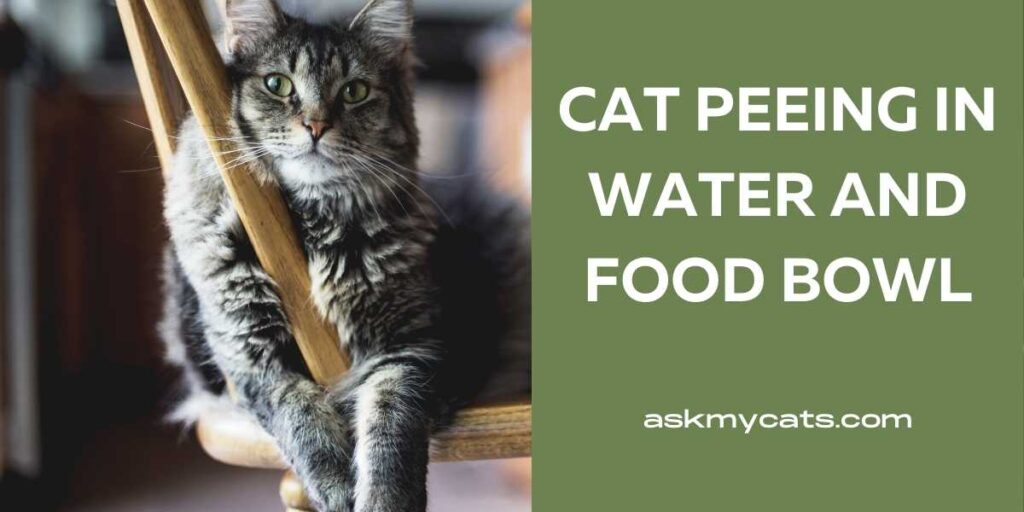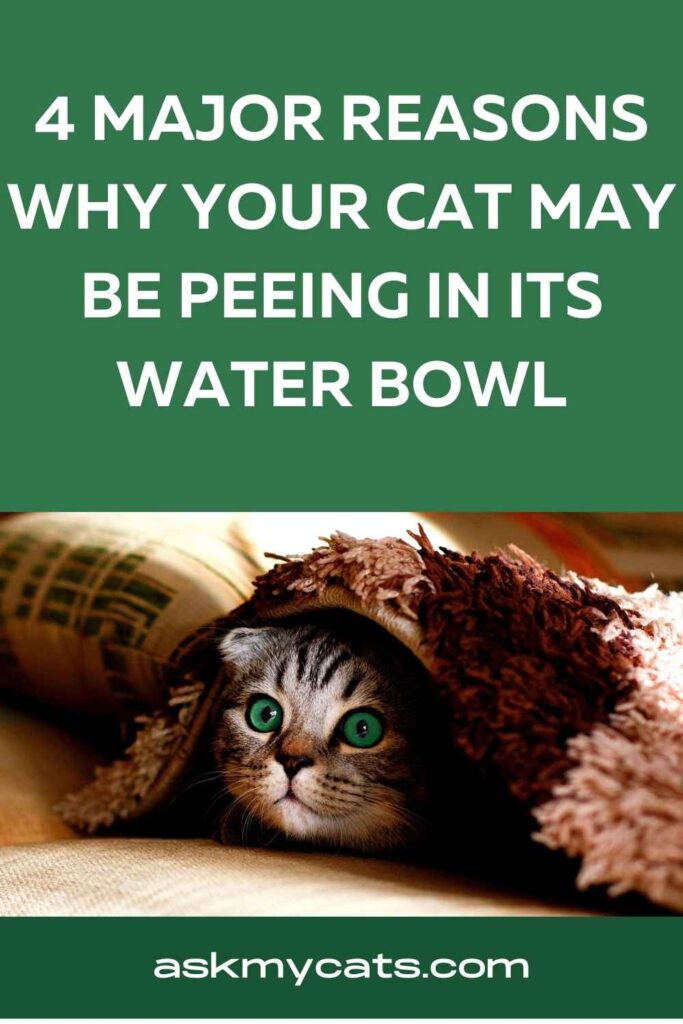Despite the cat’s reputation for meticulous cleaning, house-soiling is our feline companions’ most common behavioral issue. Many cats are left outdoors, given away, or even “put to death” because of this behavioral issue, which the veterinary profession should address.
But are these extreme behaviors necessary? Absolutely not. This problem of house soiling and urination can be totally solved if we only try to understand why is it happening in the first place.
Let us dive in without further delay and see why cats may sometimes behave in this peculiar way and what we can do about it.


Give Your Cat the Perfect Day
Get the Free Ebook!
Do Cats Pee Where They Eat?
Urinating in unusual areas can indicate either a behavioral or a medical condition, and the distinction is not always evident. When cats are sick, they sometimes pee in strange areas to attract the attention of their owners.
A cat, whether male or female, has an inherent desire to mark its territory. It is very normal for a feline to feel the need to mark their territory as their instincts fuel. They normally pick a spot and urinate on it regularly.
Cats are territorial and feel strongly attached to their environment. When cats discover their food in the same area as their litter box, they exhibit this behavior.
And this urge typically stems from psychological stress, and psychological stress can quickly lead to disease.
Some cats have solely behavioral goals and are not unwell. Some cats simply dislike using the litter box.
They may also urinate on their meal to designate it as theirs because they dislike sharing with other animals or people.
Why Is My Cat Peeing In The Water Bowl?
It is very important to find what is the culprit behind this and what can we do to correct this behavior in our felines.
There are various aspects to a cat peeing in the water bowl, some of them are purely instinct-based but others, are a need to draw the attention of the parent for a medical condition,
Let us go over a couple of them to find better solutions to this problem.:
A very primary and mostly seen reason might be that one of your cats may be suffering from a medical condition, such as a urinary tract infection or crystals/stones. Urinary tract disorders are fairly frequent in cats and can cause them to urinate in unusual places.
Once you’ve determined which one it is, you’ll need to consult with your veterinarian. Does one of the cats appear to be in distress?
If it isn’t a medical problem, then…
It may not be a factor, but adding a new cat to the mix might cause some havoc, so it could be part of the problem.
Do any of your cats need to be neutered? This would lead to the suspect being the non-neutered cat, as this behavior may be leading to unusual urination/marking activity.
The third reason is checking out if there are, any of your cats that appear worried (or have a cause to be)? Other than the new cat, have there been any other changes in the house?
Litter, furniture, box, people? Any of these factors can cause stress in a cat.
4 Major Reasons Why Your Cat May Be Peeing In Its Water Bowl

If your fussy cat is avoiding the litter box and urinating everywhere else, including the water dish, dealing with the regular cleaning and strong cat urine scent can quickly become stressful.
Most cats who urinate beyond the box have issues that can be handled, whether it’s a medical illness, stress, or a behavioral issue.
The easiest strategy to stop your cat from peeing outside the litter box is to address the root cause.
Before you become annoyed with your furry friend, Let’s quickly dive into the reasons why our friend is not using their usual allocated space for business.
1. A filthy litter box
If you are lax at cleaning your litter box our feline friends will find other places to go. Dr. Neil Marrinan of the Old Lyme Veterinary Hospital in Connecticut confirms that the litter box “experience” is nearly always the cause of cats peeing outside the box—even when a medical concern is present.
To keep your litter boxes clean, scoop the litter every day—or numerous times a day if you have multiple cats in your home.
Every 1-2 weeks, change the litter and thoroughly clean the box. Keep in mind that the feline sense of smell is far greater than ours, so a box that appears “clean enough” to you may nevertheless smell horrible to your cat. This is especially true in multi-cat families.
2. A Tough-to-Reach Litter Box
Aside from litter box cleanliness, the positioning of the boxes may induce your cat to “go” somewhere else. A basement box might be difficult for an elderly cat that has difficulty with stairs or its eyesight.
The litter box should be located in an area of the house that is relatively busy. While you may not want a litter box in your living room, putting it too far away from social areas may make it difficult to discover and unpleasant to your cat.
Place the box in a neighboring corridor, restroom, or workplace where a garbage can is easily accessible. The appropriate litter box arrangement will provide your cat with privacy and peace while also being easy for your cat to discover.
There are also litter box enclosures that are furniture items with disguised openings for cats to utilize the litter box that is invisible to houseguests.
3. Too many feline buddies under one roof
Peeing outside the litter box is more common in a household with numerous cats, especially if one is a bully who blocks another cat from accessing the box. This is why you should have one litter box for every cat, and they should be in different rooms.
If you have a timid cat in your house, make sure they have their room and a litter box that other cats cannot readily reach.
If you have numerous cats, it is recommended to avoid covered litter boxes. Some cats may be put off by covered boxes since they can’t see whether another cat is nearby.
4. Anxiety and stress
As we discussed before in the article about how our furry friends might react differently under stress and in what ways that affect their daily to-dos; l Let us investigate this further.
Cats dislike changes in their surroundings. Any change, large or little, can have a significant impact on them, such as loud noises near their litter box or relocating the box to a different location in the house.
When you know a large change is approaching, try to make adjustments gradually and consult your veterinarian about effective solutions for reducing stress. Stress can be avoided rather than treated afterward.
A frightened cat may urinate elsewhere to reduce anxiety since the fragrance of their urine makes them feel safer.
Also, find out Do Cats Poop/Pee When They Are Scared?
Why Would A Cat Pee In The Food Bowl?

We’re sorry to learn about your kitties’ difficulties. There are too many unknowns to pin this down to one item, although this may be a sort of marking or an illness.
Sometimes the problems are very surface level and can be solved by making some physical changes to regain the daily routine of cats but more often than not the problem is health-related in that case only a veterinarian can help you with the illness.
It’s possible that the ill cat isn’t the one committing the act. In other words, one cat detects that the other cat is unwell and reacts accordingly. If the cats are marking, it might be due to a territorial disagreement of some type.
It might be a reaction to cats or other animals outside the house, which is less likely. In these circumstances, one of the cats is displaying dominance over the food, which we assume occurs after they have consumed their part.
It might also indicate that someone is unhappy with the litter box or is stressed as a result of a change in the house, people in the house, or daily routines.
If it’s a territorial disagreement, it’s conceivable that something happened to cause this reaction in one of the cats. You’ll need to play cat psychologist to fix it, and you may need to boost the number of resources accessible to the cats.
For example, if they’re sharing food and water bowls, you may need to modify that and set separate food and water bowls far enough apart so they don’t compete.
If one of the cats is defending the litter box, the other cat may exhibit this behavior. Litter box guarding can begin at any point in a cat’s relationship.
Also, check out Why Does My Pregnant Cat Pee Everywhere?
Should You Consider Visiting The Vet For Your Cat’s Urination Problems?
Our feline friends peeing in the food bowl is usually a very common and frustrating behavior although they are known for their self-kept cleanliness, sometimes they do submit to these patterns.
But before jumping to deep conclusions if your cat has urinated in the food bowl for the very first time and they haven’t tried to do it again, good chances are this urinating in the food bowl might be meaningless and might even be a juvenile mistake.
Although if your kitten is not neutered and continues to urinate or attempts to urinate outside of his litter box, he may be developing urine marking tendencies.
Once learned, these habits are difficult to change with neutering. If this is the case, you should have your kitten neutered as soon as possible to prevent him from developing a habit of urine marking.
But if they are neutered and this behavior persists, you must seek advice from your vet, it is important to take things in hand as cats can contract Urinary tract disorders, even though they are very common it needs to be treated.
Cats may pee as a result of a behavioral issue. To tackle the problem, you must first understand why they are peeing in other places.
Consult your veterinarian to ensure that your cat receives the best possible care. Spending extra time with your cat to relieve stress and worry might help with behavioral issues.
How To Stop Cat Peeing In Water And Food Bowl?

Cats sometimes have problems peeing in their litter box or urinating excessively. This might be aggravating for cat owners if the cat resides in their home.
To remedy the problem, we must first determine why your cat is peeing incorrectly. Cats urinate on their owners’ beds or outside their litter boxes for a variety of reasons.
As suggested in the earlier part of the article, the reasons why a feline goes through a period of inappropriate house soiling, there are more than those facets to this behavior, but all of them circle around the same few reasons and hence easier for a cat-parent to boil down the problem and find a culprit.
You might find some reasoning similar to other sects of the article this is only to make information easily accessible and help the reader find the solution quicker;
There are several effective methods for preventing kittens from peeing:
1. Check with your veterinarian if you have any medical issues. If your cat has a medical condition, your veterinarian will advise you on the best course of action.
2. Increase your time spent with your cat. Playing with your cat more often might help to ease tension and anxiety.
3. If your cat enjoys snuggling, spend some time cuddling with them. This will make your cat feel more at ease.
4. Make sure your cat is comfortable in your house. Allow your cat more space to explore. Give your cat some toys.
5. Consult your veterinarian for the best techniques for lowering stress and anxiety in your cat.
6. Using an enzymatic cleaner, clean any areas where your cat has peed improperly. Your cat will cease marking in certain areas.
7. Place snacks in areas where your cats pee improperly. Place snacks on the bed if your cat is peeing there. Cats despise peeing around food. If you alter where your cat pees to where they eat, they will stop peeing there.
8. If your cat is peeing outside the litter box, make sure you clean it regularly. Also, give more litter boxes for your cat.
Frequently Asked Questions
How do you know if a cat has a UTI?
The most typical signs of a urinary tract infection in cats include decreased urine output, straining to pee, pain or discomfort when urinating, not urinating at all, urinating outside the litter box, and passing blood-tinged urine (pinkish color urine).
Can a dirty litter box cause UTI?
When a litter box does not get cleaned properly, they risk squatting over and stepping in old excretions. Bacteria from festering waste can travel up the urethra, causing a urinary tract infection (UTI).
What can you give a cat for a urinary tract infection?
The acidity of cranberries can lower the pH of your cat’s urine, which can help treat a UTI and stop it from coming back. Many cranberry juices are high in sugar. Instead, you can find cranberry capsules (pills), supplements, or powder to add to your cat’s diet.
Final Words
Many cats are left outdoors, or even given away, because of house soiling. Urinating in unusual areas can indicate either a behavioral or a medical condition. Some cats simply dislike using the litter box and choose instead to urinate on their food bowl.
If your cat is peeing everywhere but the litter box, you may need to address the root cause.
Dr. Neil Marrinan of the Old Lyme Veterinary Hospital in Connecticut says litter box “experience” is nearly always the cause of cats peeing outside the box.
A frightened cat may urinate elsewhere to reduce anxiety since the fragrance of their urine makes them feel safer. Peeing outside the litter box is more common in a household with numerous cats, especially if one is a bully who blocks another cat from accessing the box.
